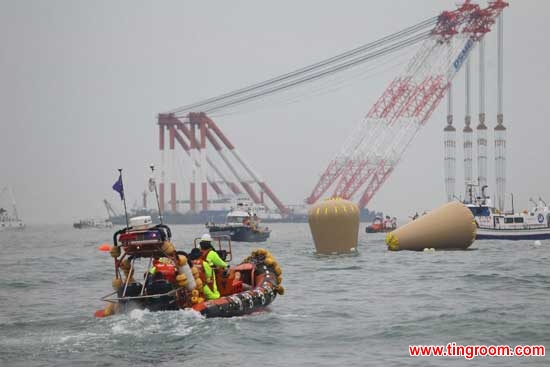CCTV9英语新闻:搜索和救援人员面对恶劣的条件(在线收听)
Leading the search for the missing ferry passengers are underwater divers. CCTV Correspondent Shane Hahm takes a look at the difficult situation they face both in and out of the water.
Air bags can be seen near the capsized ferry in Jindo on April 18, 2014. South Korean coast guard and navy divers will seek to enter into the hull of the sunken South Korean passenger ferry for three hours late Friday after failing to make their way into passenger cabins earlier. (Xinhua/Song Cheng Feng)

Air bags can be seen near the capsized ferry in Jindo on April
18, 2014. (Xinhua/Song Cheng Feng)
Any hope to find survivors in the sinking of the South Korean ferry lies in the hands of underwater deep sea divers. But their job isn’t easy. And, the natural elements are their toughest enemy.
On the ocean floor where the ferry sits, waters are murky. Visibility is so poor, divers can barely see their own hands in front of them. To make matters worse, strong water currents hamper their efforts. In an instant, these underwater experts can be swept away 50m downstream.
This civilian dive crew arrived in Jindo immediately upon hearing news of the accident. Since then, they’ve conducted numerous missions to find survivors in the wreckage, but all have ended in failure.
"We need cranes to come in and lift the vessel so that the water depth decreases. Then rescue efforts can pick up speed. But at a depth of 30-45 meters, even if there were survivors, it would be difficult to bring them up.” Rescue diver Hwang Jang-Bok said.
Military, Coast Guard, and civilian dive teams like these are all taking part in the search. Time is of the essence under extremely stressful conditions. But it’s not just the physical toll their bodies are put under. The mental toll weighs heavily as well.
"Even if we had physical stress, we wouldn’t be able to feel it. We haven’t slept in days. We work throughout the night. We eat one meal a day. But, I can’t even fathom what the families are going through.” Rescue diver Choung Dong-Nam said.
The divers understand what family members with loved ones still missing are going through. That’s why they can’t bear to see the disappointment on their faces when they come up from the water empty-handed. So until all of the passengers and crew members onboard that fateful ship are accounted for, divers will work around the clock putting their own lives at risk to help save another’s.